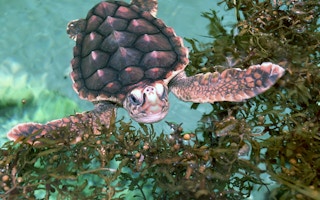Philanthropic organisations have joined forces to launch a marine fund for Southeast Asia at the COP16 biodiversity conference in Cali, Colombia as governments are urged to work together to meet a global “30x30” conservation target that many are falling short of.
To continue reading, subscribe to Eco‑Business.
There's something for everyone. We offer a range of subscription plans.
- Access our stories and receive our Insights Weekly newsletter with the free EB Member plan.
- Unlock unlimited access to our content and archive with EB Circle.
- Publish your content with EB Premium.
Under the Kunming-Montreal Global Biodiversity Framework – an international agreement to halt and reverse global biodiversity loss – adopted at last year’s COP15 summit, governments pledged to conserve 30 per cent of the world’s land, freshwater and ocean area as protected area by 2030. But progress is faltering with a global assessment commissioned by the Bloomberg Ocean Fund and published earlier this month suggesting that the ocean target remains a long way off.
In a press statement, philanthropy organisations Rumah Foundation, Oceankind and Asia Community Foundation which are behind the new 30x30 Southeast Asia Ocean Fund, said that only less than 3 per cent of Southeast Asia’s national waters are under formal protection.
To date, only four out of 11 Southeast Asian countries have joined the High Ambition Coalition for Nature and People, an inter-governmental coalition that aims to deliver on the global 30x30 conservation target, highlighted the press statement. These include Cambodia, Indonesia, Malaysia and the Philippines.
The new fund seeks to create new marine protected and conserved areas in the region, as well as extend its coverage beyond designated Marine Protected Areas (MPAs) to include other biodiverse areas. These include locally-managed marine areas (LMMAs) or other geographically-defined areas that are achieving long-term and effective conservation outcomes outside of protected areas.
Kathlyn Tan, director of Rumah Foundation, urged funders to come together, as ocean philanthropy currently stands at a critical point.
“By supporting the 30x30 goal, funders can play a vital role in safeguarding the livelihoods of millions and the ecosystems that sustain them, while also contributing to climate change mitigation and adaptation,” she said.
The fund will also look at strengthening the effective management of existing marine protected and conserved areas. It is open for expressions of interest from local actors and conservation practitioners across the region and globally.
As one of the most biodiverse marine regions in the world, Southeast Asia is home to approximately a third of the world’s coral reefs, 33 per cent seagrass beds and 31 per cent mangroves.
Oceankind’s programme officer Mariko Powers emphasised the need to engage local communities to advance equitable and effective ocean conservation.
“We believe that investing in local capacity to drive ocean protection is key to achieving 30x30.”
Southeast Asia is home to over 10 million people who rely on ocean-based livelihoods, such as fisheries and aquaculture.








